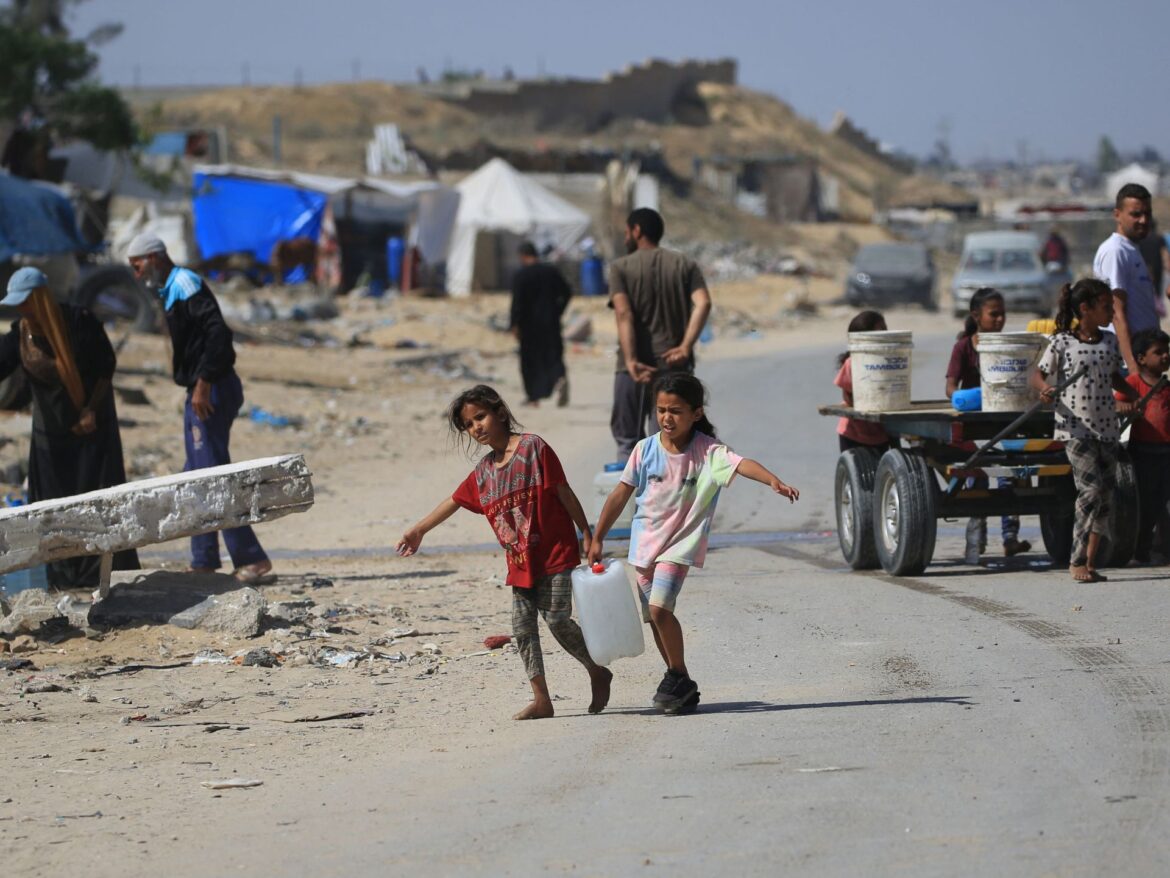The seawater desalination plant on the shore of the city of Deir al-Balah (in the besieged center of the Gaza Strip) is witnessing unprecedented overcrowding of displaced Palestinians wishing to fill small gallons of water or large barrels carried by trucks and buggies.
Many displaced people in Deir al-Balah or the Al-Mawasi area west of Khan Yunis (south of the Gaza Strip) are forced to walk long distances on foot and wait for hours in front of the station until they can provide limited quantities of water, in addition to institutions and associations filling large tanks to distribute them to the displaced in areas Distant displacement.
Al-Mawasi is divided into two geographically connected areas, one of which belongs to the Khan Yunis Governorate, and is located in the far southwest of the governorate, while the second belongs to the Rafah Governorate.
The population of Gaza in general suffers from many humanitarian crises, including a severe water shortage as a result of Israel cutting off water and fuel supplies, and targeting water facilities and wells in many governorates, as part of its devastating war that began on the seventh of last October.
Many battles
The young Palestinian man, Ahmed Mahmoud, stands in front of the desalination station located on Al-Rashid Al-Sahili Street, under the blazing sun, trying to obtain water by filling a small gallon.
Mahmoud (34 years old) says, “Since the beginning of the war on the Gaza Strip, we have been living in many battles every day, including the battle for obtaining water. We cannot surrender or be defeated in it, because that would mean worsening our suffering.”
He added, “Every day I go out in the morning to fulfill our needs, fill gallons of fresh and salt water, and return to light a fire to cook food, but obtaining water is the most difficult and intense of these battles.”
As for the young man Anas Qaoud, who was displaced from the Sheikh Radwan neighborhood to the city of Deir al-Balah in the middle of the Gaza Strip, he says, “We are suffering from a severe water crisis since the displacement of citizens from the city of Rafah, due to the population density in Deir al-Balah, where there is no longer enough space after the displaced people set up tents.” Everywhere, street and alley.”
He explained, “Water was not sufficient for the residents of Deir al-Balah and those displaced there, but the displacement of Rafah’s residents and those displaced there made matters more difficult and complicated, and we now stood in long lines to fill one gallon of water or a bucket of water to wash clothes and utensils.”
He shows that the price of a gallon of fresh water has risen and has become 3 shekels instead of one shekel (one dollar equals 3.69 shekels). We now fill it for free once or twice a week, after it was free, and for the rest of the week we buy it, demanding an end to the devastating Israeli war and the return of the displaced to Gaza City. And the north.
Daily suffering
As for the Palestinian Umm Nabil, who was displaced from the northern Gaza Strip to Deir al-Balah, she experiences daily suffering to obtain sweet and salt water, especially with the intensification of the crisis following the displacement of Rafah’s residents.
The citizen says, “We have been displaced from the northern Gaza Strip since last November, and we live in tents inside Al-Aqsa Martyrs Hospital, east of Deir Al-Balah, and our greatest suffering is obtaining sweet and salt water.”
Palestinian women are forced to stand in lines for long hours under the sun to obtain drinking water, but these attempts fail, either because the water is cut off or a malfunction occurs.
She points out that repeated water outages and disruption of the filling process make the displaced people have difficulty obtaining small amounts of water, which increases their suffering.
Umm Nabil explains that the new numbers of displaced people from the city of Rafah have increased pressure on water, whether potable or salty.
The responsible authorities call on “increasing water filling points in Deir al-Balah and the areas sheltering displaced people, so that everyone can obtain water appropriately.”
On Tuesday, the United Nations Relief and Works Agency for Palestine Refugees (UNRWA) said that one million Palestinians were forced to flee from the city of Rafah in the southern Gaza Strip during the past three weeks, as a result of Israeli army operations coinciding with intense bombing.
She pointed out, “The lack of food and water, the accumulation of piles of waste, and the unsuitable living conditions make providing assistance almost impossible day after day.”
Rafah operation
This wave of displacement came as the Israeli occupation army expanded its incursion into Rafah at dawn last Tuesday, becoming 3 kilometers from the seashore, and approaching geographically isolating the sector from Egyptian territory.
Since October 7, Israel has been waging a devastating war on the Gaza Strip that has left more than 16,000 martyrs and 81,000 Palestinians wounded, most of them children and women, and about 10,000 missing amid massive destruction and famine that claimed the lives of children and the elderly.



